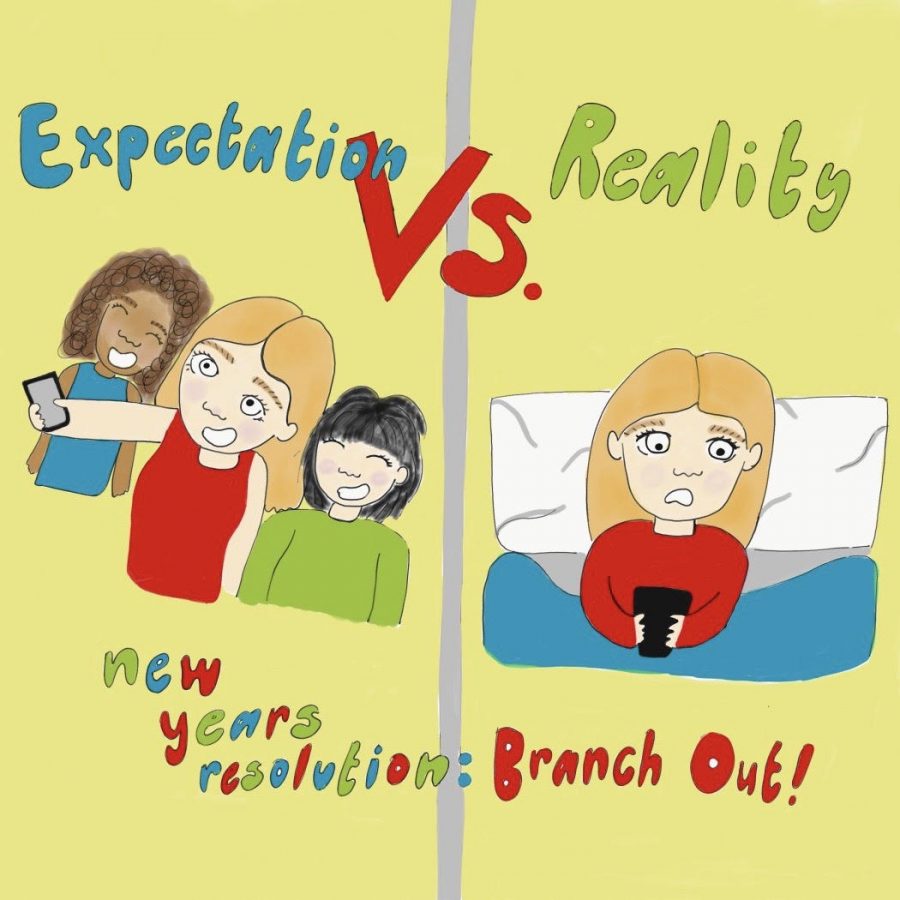“New Year, new me” creates unrealistic expectations
January 31, 2020
2020, a new year, a new decade. Long forgotten are the pitfalls of 2019 and here we are, ready to welcome the new beginnings that 2020 may bring.
Resolutions are a key aspect of the New Year. We use them to help better ourselves. While the historic conceptions of New Year’s resolutions have ties to ancient Babylon, according to The Economist, the mentality of setting new goals at the onset of the new year is ubiquitous. Yet, many people who make New Year’s resolutions, roughly 80 percent, usually end up dropping them before the end of February, according to U.S. News & World Report.
“No [I didn’t keep up with my New Year’s resolution], but I didn’t expect to. It makes me feel a little disappointed, but I know I’m not the only one who didn’t keep their resolution. Everyone says they’ll do something and never ends up doing it,” sophomore Isabel McDermott says.
Ultimately, New Year’s is simply to celebrate our survival of the previous year and working to welcome a new one, but often we welcome this New Year by trying to change ourselves, living by the phrase: “new year, new me.”
People try to use this phrase to motivate them to accomplish their goals. If you were unhappy in 2019, you can change because it’s 2020. For some people, rather than being a motivator, it becomes a stressor.
“I’ve only heard the term ‘new year, new me’ a couple of times, but I can definitely see why it might be harmful to a person’s idea of their own self-worth. In most cases, ‘new year, new me’ is probably meant to help people start over,” sophomore Erin Elliott says, who did not make a New Year’s resolution. “But if they needed to start completely over and develop a whole new personality, then they might start seeing flaws about themselves that don’t exist or flaws that you would have to look impossibly close to see because they need to ‘fix’ themselves for the new year.”
By changing ourselves, we aren’t celebrating what New Year’s is intended for. New Year’s is about the culmination of the previous year and the celebration of a new one. It’s all about the survival of the previous year, but if all we are focusing on is our imperfections and how we didn’t change, that impactful message gets lost. By constantly trying to change our lives, we won’t ever be able to truly love ourselves. We will be more concerned about our imperfections.
Many of these resolutions are about health or body image. According to Parade, the top New Year’s resolutions are about losing weight, exercising or eating healthier, all of which can put some people in a problematic mindset if they are pursuing these goals superficially and not caring for their overall emotional and physical well-being.
There’s a big difference between setting realistic resolutions for yourself and big sweeping ideas like “new year, new me.” By setting realistic resolutions for yourself, you can grow as a person through reflection. However, overarching ideas like “new year, new me” are generalizations that can harm people because if they are taken to the extreme, people will only be focusing on changing themselves instead of focusing on accepting and loving themselves.
For students like McDermott, setting New Year’s resolutions can be an opportunity to work on one’s well-being.
“I made it because I needed to change the way I took care of myself. I didn’t like the way I was eating so I wanted to start eating healthier and exercising more,” McDermott says.
As humans, we all want to grow. We want to say we have changed for the better, which could be a part of the coining of the phrase “new year, new me.” And yet sometimes, we fail to recognize that we don’t need to constantly be trying to improve. It’s okay to stay the same because if we feel happy and secure, that’s all that matters. We need to learn to accept and love all aspects of ourselves.
We hear about body positivity, but it’s also important we experience mental and self positivity. We all have things we don’t like about ourselves, but rather than trying to change that, there comes a time where acceptance is the only road to allowing ourselves to be our best, and our happiest.
According to Psychology Today, “positive self-talk is about recognizing the truth in situations and in yourself. When negative events happen, positive self-talk seeks to bring the positive out of the negative to help you keep moving forward. The practice of positive self-talk is often the process that allows you to discover the obscured optimism in any given situation.”
Positive self-talk and overall mental positivity are powerful. We all make mistakes and rather than always expecting perfection out of ourselves, if we try to be realistic, then we can allow ourselves to be happier.
“Sometimes you can’t always get positive feedback from the people you need it from, so if you can get that positive self talk, I think it’s very useful in achieving things,” says freshman Heath Grossman, who also did not make a New Year’s resolution.
This new year, let’s try to actually practice loving ourselves. Take time out of your day to journal and write about what you’re grateful for to show yourself what you have in life. There are so many ways to change and revitalize ourselves. If we don’t worry about forcing ourselves to dramatically change, we can have a fun and healthy New Year. We can make the New Year what we want it to be, not how we expect it to be.












